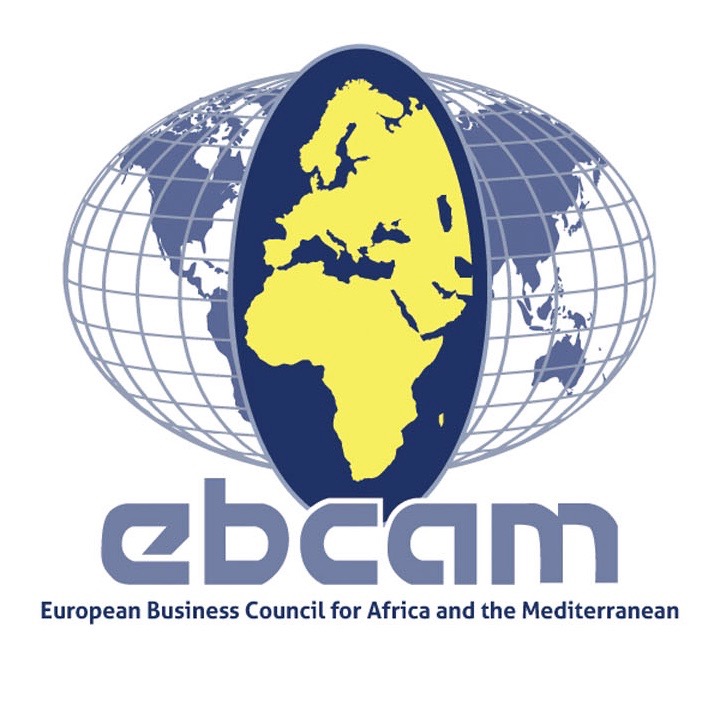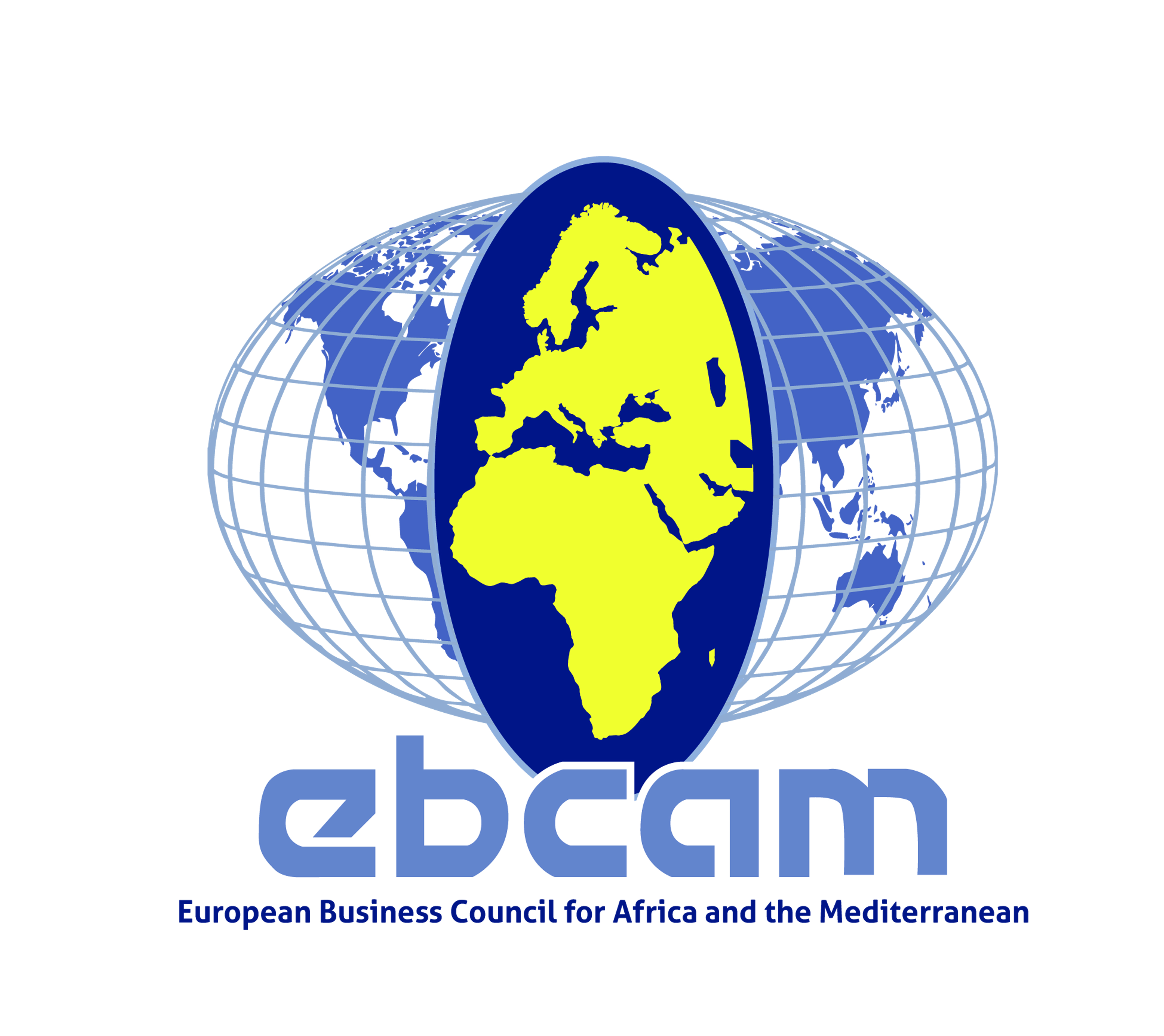AU-EU Business Forum 2025 - Joint Business Declaration of the Business Organisations

PRESS RELEASE
For Immediate Release
Luanda, Angola – 24.11.2025
African and European Businesses Commit to Strengthen Investment and Shared Prosperity under Global Gateway
Business support organisation leaders from Africa and Europe have issued a call for stronger partnerships, enhanced predictability in the business environment, and deeper value chain integration to realise sustainable economic growth across both continents. The Joint Business Declaration, announced on 24 November at the AU-EU Business Forum (AEBF2025) in Luanda, Angola, is presented on the occasion of the seventh Heads of States AU-EU Summit taking place on 25 November.
EBCAM RELEASES POSITION PAPER ON THE CREATION OF A EURO-AFRICAN FREE TRADE AREA

Brussels, 13 October 2025
The European Business Council for Africa (EBCAM) had a fruitful discussion with the European Commission’s DG TRADE to advance the creation of a Euro-African Free Trade Area, aligned with the African Continental Free Trade Area (AfCFTA).
EBCAM RELEASES PAPER ON THE WAY FORWARD WITH THE GLOBAL GATEWAY STRATEGY

EBCAM POSITION PAPER ON THE WAY FORWARD WITH THE GLOBAL GATEWAY STRATEGY
Brussels, 17 April 2025
The European Business Council for Africa and the Mediterranean (EBCAM) released its position paper on the European Union’s Global Gateway strategy, outlining the unanimous opinion of its members and proposals on this important EU action. The paper, titled “Engaging the European private sector in the Global Gateway strategy for Africa - Challenges and ways forward”, addresses the need for more substantial and structured involvement of European companies in Global Gateway projects across the African continent, especially in this era of fierce competition with non-European actors.
Policy Paper: "Basel IV: “Is financing foreign trade with Africa going to become more difficult?"

Policy Paper
"Basel IV: “Is financing foreign trade with Africa going to become more difficult?"
Brussels, Wednesday 16 November 2022
The European Business Council for Africa (EBCAM) in association with its member Afrika-Verein der deutschen Wirtschaft (German-African Business Association), has adopted a new policy paper on "Basel IV: “Is financing foreign trade with Africa going to become more difficult?".
This policy paper, although it does not doubt the necessity of Basel IV, expresses some concerns about this new set of financial rules currently under negotiation. It points out specific provisions in Basel IV that, as an unintended side effect, may have a negative impact on the financing of international trade and thus also on trade with Africa.
7th European African Business Forum (EABF) - Joint Declaration of the Business Organisations

15 February 2022
On 14 February 2022, EBCAM, together with the European Business Organisations Eurochambres, BusinessEurope and CEA-PME as well as our African partners, submitted to the European institutions the Joint Business Declaration of the twelve Working Groups of the 7th European African Business Forum being held this week. This was accompanied by annexes comprising of areas of specific concern and proposals by each of the EABF Working Groups.
EBCAM has been leading in four of the Working Groups organising High Level Panels at the forum: energy, health, automotive and agribusiness. The Joint Business Declaration is the result of a long cooperative process amongst the European and African Business Organisations partaking in the drafting committees.
EBCAM position paper on strengthening the private sector's contribution to development by using public funds to de-risk impactful investments

EBCAM POSITION PAPER
Strengthening the private sector's contribution to development by using public funds to de-risk impactful investments and
Creating a dedicated, more flexible financial instrument to support private investments that promote development
Brussels, 19 January 2022
In 2017 the European External Investment Plan (EIP) was adopted, and it has, to some extent, recognised the role of the European private sector in economic development. However, the European Business Council for Africa (EBCAM) considers that the European private sector is still neither sufficiently represented nor supported when it comes to the development of African economies. A strong mobilization of private investment is essential in order to revive these economies after the pandemic.
Africa can become one of the most important partners for Europe politically and economically. EU-Africa policy should be geared to this. The African continent requires much greater attention, beyond traditional development cooperation, and in close cooperation with the private sector.
EBCAM believes there are significant weaknesses in the European Official Development Assistance (ODA) with regard to the private sector and that the existing financial instruments used by Development Finance Institutions (DFIs) for private enterprises are ill-suited due to the purpose:
• Their intervention thresholds are high and are usually limited to projects of at least €10 million.
• DFIs tend to be risk-averse and represent an overly conservative approach to risk.
Therefore, EBCAM proposes rethinking support for private enterprises in Africa by:
EBCAM Position Paper on EU Human Rights Due Diligence Legislation for companies

EBCAM POSITION PAPER
EBCAM Position Paper on EU Human Rights Due Diligence Legislation for companies
Beussels, 06 August 2021
Earlier this year, the European Parliament adopted a proposal made by the European Commission on a binding draft EU Human Rights Due Diligence Legislation where companies have to prove that their international supply chains respect due diligence obligations (human rights, environment and good governance).
The European Business Council for Africa (EBCAM) fully agrees that human rights and environmental violations need to be tackled. Nevertheless, we note that this law might cause opposite effects from those intended for and will harm the sustainable development of local economies in the African continent. We would like to highlight that:
- it is quite impossible for EU companies to guarantee “zero risk” on their supply chains in Africa,
- European medium-sized enterprises and large companies will deliberate even more carefully about
whether they can engage in African countries, - especially the issues of the informality in the agricultural and agri-food sectors and the deforestation need
to be taken into account.
The European Union has to assert its role as Africa’s leading partner

OPINION
The European Union has to assert its role as Africa’s leading partner
Patrick SEVAISTRE: Special Advisor EBCAM (European Business Council for Africa)/ CIAN (Conseil français des investisseurs en Afrique)
* The opinions and views expressed in this publication are those of the author.
Brussels, 08 July 2021
In March 2021, the members of the European Parliament approved the new EU-Africa strategy, adopted a year earlier by the European Commission and the EU High Representative as a joint communication. The stated objective for Europe is to establish a new relationship from continent-to-continent that leaves behind the donor-recipient model, to empower African nations to achieve the SDGs (Sustainable Development Goals), to ensure a successful green transition, to accompany and support Africa’s vision and ambitions for a continental free trade area.
One of the few achievements of this new partnership strategy today is the renewal of the EU-ACP partnership under a post-Cotonou Treaty agreement. At the moment, this renewed Cotonou Treaty is the only legal framework governing trade between Africa and Europe. The need for a framework agreement between the European and the African continent has never been stronger than in the post-Covid context.
EBCAM COVID-19 - Health Africa Position Paper

EBCAM POSITION PAPER
COVID-19: The public-private sector partnership is the key to a successful strategy for Africa
Brussels, 02 June 2021
A year after the start of the COVID-19 pandemic, the health impact on the African continent is less severe than expected. The African resilience is due to its young population that is less at risk compared to other continents, its low urban concentration that limits the circulation of the virus and above all the experience in managing epidemics. A deficient tracing system and a lack of causes of death have to be mentioned, too.
However, these relative “advantages” in dealing with the pandemic have not spared Africa economically and socially as it has been facing a more deadly second wave since the end of 2020. This results in a collapse in the price and demand for raw materials, together with a fall of the African GDP by 2.6% in 2020.
The exit from the economic crisis will be slower in Africa as most countries do not have the same means European countries have.
EBCAM concerns about African continent’s access to vaccines: the delay in the deployment of national COVID-19 vaccination campaigns in Africa has revived the debate on relocation to Europe or the installation of industrial capacities to manufacture tests, vaccines and drugs in the African continent. The COVAX initiative is expected to cover only 20% of the African population with COVID-19 vaccines.
EBCAM Position Paper On New EU Trade Strategy

EBCAM POSITION PAPER
EBCAM POSITION PAPER ON NEW EU TRADE STRATEGY
Brussels, 30 April 2021
The European Business Council for Africa and the Mediterranean (EBCAM) welcomes the new Trade Strategy communicated by the European Commission and agrees with the need for open, rules-based trade to restore growth and job creation post COVID-19 as well as the increased focus on Africa. Equally important is the emphasis on a green and digital transformation of the economy.
As representatives of the European entreprises that are actively engaged in Africa, we encourage the EU policymakers to ensure continuous and unlimited access to key resources – raw materials, goods, services, investments. EBCAM believes that more should be done to address the issue of injurious subsidization of enterprises from other states that allow their entities not to abide by international standards, as for example happens with China, Russia, Turkey and other countries.
For EBCAM members and their African private sector partners, the AfCFTA is an important step forward towards the creation of regional supply chains, which have been important drivers of economic transformation in many countries.




